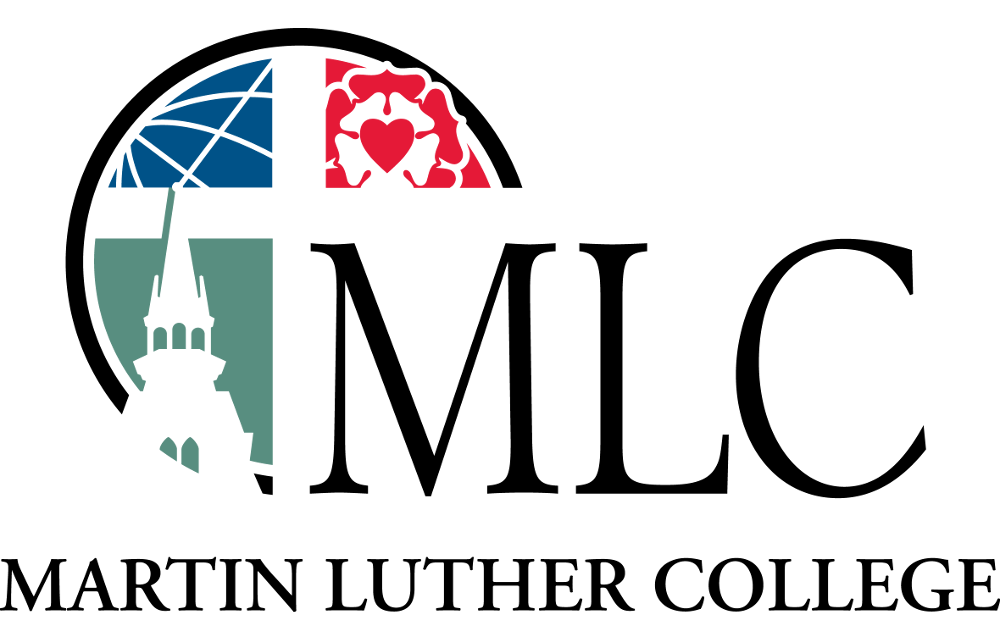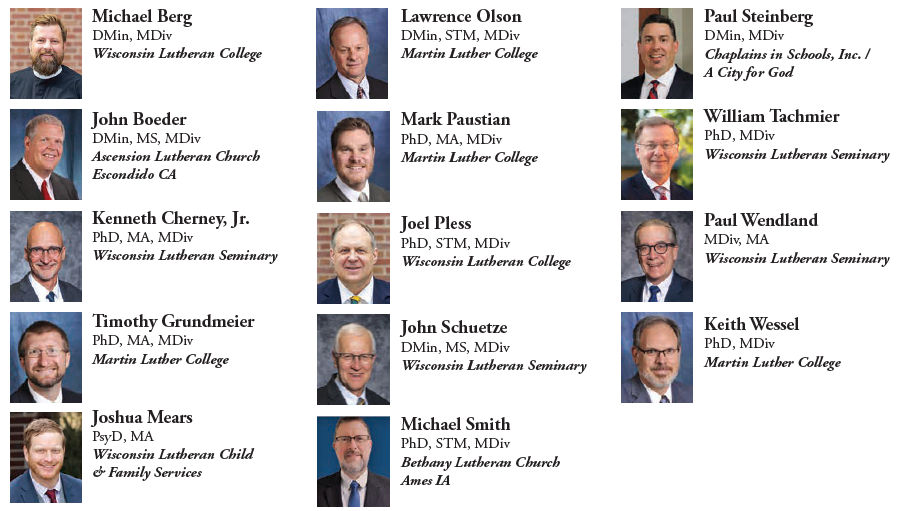Diving Deep into the Word
MLC’s Master of Arts in Theological Studies
A high school religion teacher, a college math professor, a family minister. Their ministries are different, but their desire to grow in the Word is the same. That’s why Instructor Ben Carlovsky, Dr. Kristi Meyer, and Staff Minister Brandon Steenbock all pursued a Master of Arts in Theological Studies at Martin Luther College. What they found is that they are growing, just as they’d hoped, but the benefits are not for them alone. As the Word lives in them in new and deeper ways, they’re sharing this with their fellow Christians every day. Let’s see what they have to say.
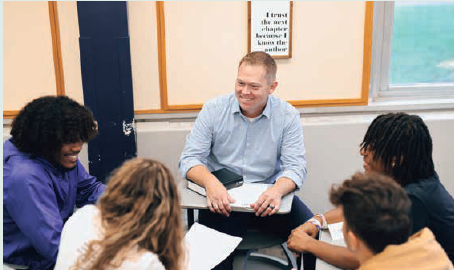 Ben Carlovsky
Ben Carlovsky
High School Religion Teacher
Ben Carlovsky MLC ’03 was originally enrolled in MLC’s Master of Science in Educational Administration program. As an elementary school principal at Abiding Word-Houston, that made sense. But when he accepted a call to teach religion at Wisconsin Lutheran High School, he switched programs midstream. Now he’s a 2023 graduate of our Master of Arts in Theological Studies program, a program with deep content to match his deep passion.
Why he enrolled: I wanted to dig into the Bible and to learn more about the content that I’m teaching at Wisconsin Lutheran High School. I took classes ranging from New Testament Studies to Mission Trips, from Apologetics to Hermeneutics. I not only wanted to grow in my content knowledge, but also learn from the amazing teachers and my fellow students in the program. I enjoyed reading and learning from their perspectives.
What he found: The program exceeded my expectations. The wide variety of teachers and topics was much appreciated. And I enjoyed the structure of the classes, which allowed me to fit them into my schedule.
Some specific examples: I greatly enjoyed the perspectives gained in my Biblical Hermeneutics classes with Pastor Paul Wendland [retired Wisconsin Lutheran Seminary president and professor]. How to interpret the Bible is a skill that can be used across the classes that I teach. I also enjoyed how we could raise questions from our classrooms, and we were given biblical feedback and best practices. I also enjoyed Old Testament with Dr. Ken Cherney and Dr. John Boeder’s class on mission trips. Both were extremely applicable and timely.
Getting fed: This program was so heavy on the Bible, and the Bible works! It works on all of us. I personally read and reflected more often on the promises of God during the completion of this program.
Feeding others too: I am passionate about teaching students about God and his Word. As I took the classes, I found myself incorporating the conversations and topics into my teaching. I know that my students have benefited from my time in this program. His encouragement: I would say that you should be ready to work, but the work pays off. Find a program that excites you, and continue to work and grow in that area.
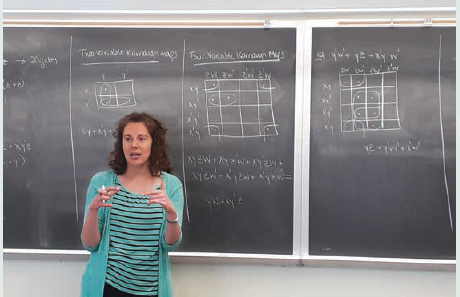 Dr. Kristi Meyer
Dr. Kristi Meyer
College Math Professor
Why would a professor with her PhD in math go back to school and pursue another degree . . . a degree outside her field . . . a degree in theology? We wondered too.
So we talked to Dr. Kristi Meyer, a mathematics professor at Wisconsin Lutheran College. Dr. Meyer is a WLC graduate who earned her PhD in mathematics from Iowa State University, and then earned her master’s degree in theological studies here at MLC. She says that she may teach math, but theology is her field. It’s all our fields.
Why she enrolled: I’ve had an interest in theology for quite a while. I toyed with the idea of pursuing staff ministry certification through MLC, but that didn’t feel like quite the right fit. When the MATS program first started in fall 2018, it was the right fit and gave me the opportunity to study both theoretical and practical theology and earn an advanced degree.
Her main goal: To continue learning about theology in a deeper way, a more focused and intentional way. Our ministerial education schools are blessed with amazing professors, and I was hoping to grow in my knowledge of God and his Word by sitting at their feet—an opportunity that likely would not have been possible for me without the MATS program.
The program fits into a busy schedule: The structure of the program is fantastic for called workers. The vast majority of the program has been asynchronous. This allows me to do my homework when it’s convenient for me (which is often at 6:30 am). The professors are also really good about posting materials and assignments in advance. If I know I have a busy couple of days coming up, I can plan out when I’m going to do my homework and not have a deadline sneak up on me.
She discusses it with her college students: Interestingly, one of the biggest impacts has been on the relationship with my WLC students. I don’t talk about my MATS classes super often with my students—remember that
I teach math—but I do occasionally bring it up. My students have been extremely supportive and interested in what I am studying, and this has led to conversations that allow me to witness in a new and unexpected way.
She’s experienced a mindset shift: I tend to carry theological concepts with me all day long. When I have an assignment due or when I’m working on a paper, my topic is always there, even though I’m not actively writing. It’s not always at the forefront of my brain, but it is always there in the background. And it’s really neat to have theological ideas and concepts always there in the background.
Her encouragement to you: Start by taking just one class. Even if you’re not sure that you want to pursue an advanced theological degree, you can still take one class. If you decide the program isn’t for you, that’s totally fine. But I’m guessing you will decide that the program is for you, and you’ll want to continue taking more classes! One of my pastors is fond of a saying I also love: “Time spent in God’s Word is never time wasted.” And the MATS program most definitely has its participants spending time in God’s Word. Yes, it’s a commitment; yes, it’s work. But it is incredibly beneficial in so many ways, and that’s the thought I’d like to leave with people, especially potential MATS students.
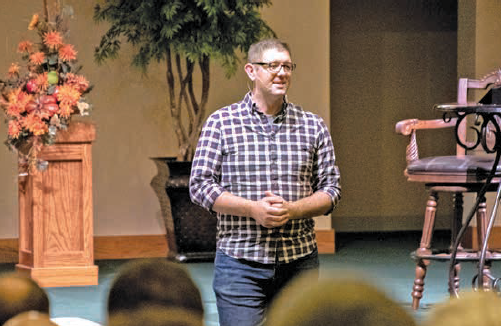 Brandon Steenbock
Brandon Steenbock
Congregational Staff Minister
He’s the family minister at St. Mark-Green Bay WI, where he shares God’s Word in interesting ways every day, including Bible studies, catechism class, pre marriage and marriage enrichment classes, and the livestreamed “Pub Theology,” where they drink beer and talk about God. He also loves to study, so pursuing a master’s in theology made sense. But for Brandon Steenbock MLC ’06, studying theology isn’t just a personal pursuit. It’s something he does for the people he serves.
Why he enrolled: I find that I do ministry best when I’m learning, because it feeds me with new ideas and new ways of thinking. I’m naturally curious and creative, and learning charges up those gifts. After finishing the Master of Arts in Theological Studies program, I completed a Doctor of Ministry program. I want to be the best teacher of God’s Word I can be. Even though I’ve finished formal education for now, I’m never going to stop reading and learning.
The synergy of teaching and learning: If I’m writing a Bible study or preparing a devotion, I’ll incorporate things I’ve just been learning in my class. Or on the flipside, when I’m posting in the discussion boards for a class, I can incorporate things I’ve just been working on or conversations I’ve had in my ministry. These courses fill up my brain and my soul. When I’m not working with the Word for my ministry, I’m studying the Word for classes. Or I’m thinking about it while I’m doing other things. I’m constantly investing myself in it. That not only opens up new areas of curiosity and understanding, but also gives me new ideas about how to apply it. And I love passing on what I’m learning to other people.
His encouragement to you: The cool thing about pursuing an advanced theological degree is that it opens your eyes to all the things about Scripture you don’t know. It raises all the questions you never knew you should be asking. It exposes you to the perspectives and debates theologians have asked across the centuries and all the different ways they tried to answer the really big questions. It gives you permission to question and assess the conclusions of long-dead theologians and realize that they were just people trying to understand God’s Word, just like us. And best of all, it gives you a chance to grow closer to Jesus as you gain a deeper understanding of how his truth has been communicated through his church over the past 2,000 years.
Advanced degrees are important for the whole synod: For many years we’ve had to turn to other institutions and church bodies to get advanced education. That’s getting better, but only because more of our people are getting the education needed. It’s such a blessing that MLC provides more of this continuing education, but to preserve that blessing, we need people who take the time to pursue it. It’s worth it—not just for ourselves, not just for our own ministries and churches, but for our synod and the church as a whole.
Master of Arts in Theological Studies Faculty
Master of Arts in Theological Studies
This program is for you if you are a teacher, staff minister, or lay leader (with some theological training) and now want to . . .
- Investigate the tools needed to interpret Scripture.
- Be better prepared for Bible class, catechism class, evangelism,
or counseling. - Explore what God says about some of today’s complicated
ethical questions. - Gain wisdom to counsel the troubled in your church.
- Learn what church history teaches about the church today.
- Gain confidence in leading others to a deeper walk with Christ.
- Construct your own personal philosophy of ministry.
If this program is for you . . .
